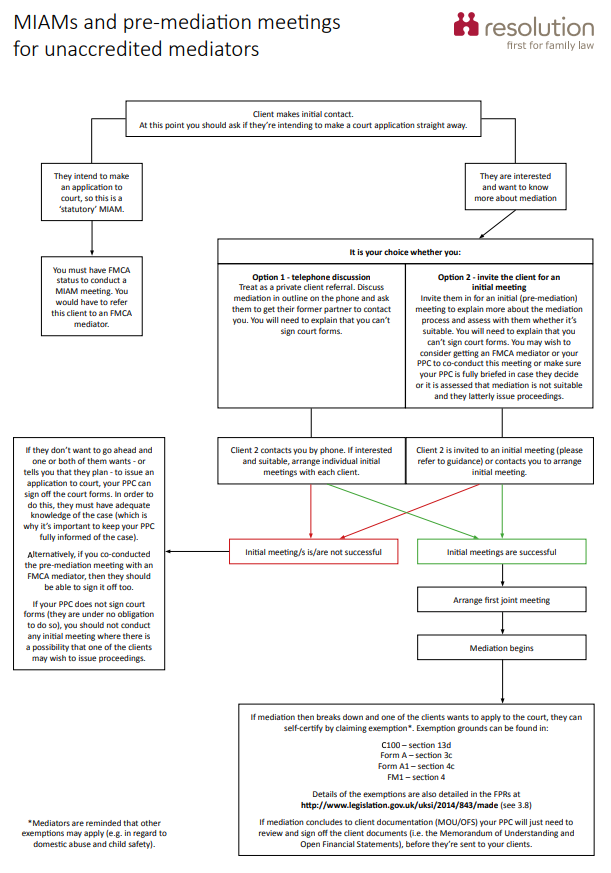Flowchart and podcast: MIAMs and pre-mediation meetings for unaccredited mediators
This article looks at what's required with the initial client contact before mediation.
Key things to note:
- All mediators can conduct pre-mediation and initial meetings with potential clients whether or not they are accredited.
- It is only a ‘statutory’ MIAM (when a potential client makes contact and they have an immediate and settled intent to issue proceedings) that has to be conducted by an FMCA mediator.
- If you are not accredited, it is still possible for your PPC to sign court forms if the initial meeting/s with the clients aren’t successful. It’s important to note that PPCs are not obliged to do this: you should talk to your PPC to ensure you’re clear about how this is to be managed, what and how much information your PPC will need in order to sign forms and how much they will charge.
- Clients do not automatically have to be issued with a court form unless they tell you that they intend to issue proceedings straight away. It’s important that you don’t confuse people or push them into issuing proceedings when they could resolve issues in another way.
Initial client contact
When a potential client makes initial contact it’s important to establish whether they’re about to issue proceedings. If they are, they will need to attend a statutory MIAMs with an accredited mediator. You should give them information about accredited mediators in your area or refer them to the Find a Mediator section on the Family Mediation Council’s website.
If the client is keen to attend mediation or wants to find out more about resolving their issues outside of court, you can:
- listen to their needs and what issues are important to them
- provide information about the principles of mediation
- start your process of screening and assessment for any risk of harm
- advise them of the costs
- explain how you normally work with clients.
This can be done over the telephone (see option 1) or by inviting them in for an initial meeting (see option 2).
Option 1 – telephone discussion
You’ll need to explain to the client that you aren’t able to sign court forms.
Ask them to arrange for their former partner to contact you so you can have a similar conversation with them, covering the points above. Both clients can then make an informed choice about coming in for a first individual meeting.
Option 2 – invite the client for an initial meeting
If you invite the client in for an initial meeting, you should have discussed with your PPC whether they will sign court forms and, if so, what information they’ll need from you to do so.
Alternatively, you may wish to co-conduct the meeting with your PPC or another FMCA mediator so they can sign the court form should the client subsequently decide to issue proceedings.
If your PPC does not sign court forms and you don’t conduct the initial meeting with an FMCA mediator, you will need to refer the client to an FMCA mediator for a statutory MIAM if the client decides to issue court proceedings.
If this were a statutory MIAM, there would be a requirement to provide with the details of the other person so you could make contact. This is not the case with initial meetings and you must take care to respect the ex-partner’s right not to be ‘cold called’. It’s possible that their ex-partner may not know the client is considering mediation, or even that the relationship has ended.
You should discuss this with the client and decide with them how best to contact the other person. Ideally you would ask them to arrange for their former partner to contact you, as you would with a first telephone call (see option 1). It’s useful to give the client some information about mediation that they can pass on to their ex-partner.
Signing court forms
You should ensure your website and promotional material make it clear you cannot sign the court forms required if an individual intends to issue proceedings, together with information about how to access local FMCA mediators who can provide this service. It’s helpful to ensure that local Resolution solicitors are aware you can offer pre-mediation meetings but not statutory MIAMs, so would be unable to assist clients intent on issuing proceedings.
You should remind any potential client you meet with that you cannot sign court forms.
If mediation breaks down
If the mediation breaks down and the clients subsequently decide to issue proceedings, they can self-certify the court form under the exemption grounds (see Practice Direction 3A and FPR 3(8)1d). This shows that a form of family dispute resolution has started but has broken down.
The exemption only applies if they issue proceedings within four months of the last joint meeting and the dispute or matter for which they intend to issue is the same or broadly similar to that which they tried to solve in mediation.
You should be aware that there are other exemption categories that may apply, such as domestic abuse or issues of child safety. You should ensure that you provide information to people accurately if or where one of the exemption categories would apply.
For more information, please see the Resolution Good Practice Guide on Mediation and the FMC Guidance on Initial Meetings and MIAMs.
